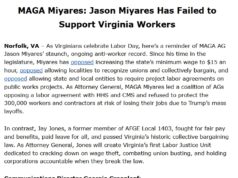Rand Paul spent most of today trying to dig himself out of the giant hole he dug for himself on last night’s Rachel Maddow Show. Paul’s performance on Maddow was a epic nineteen minute long self-destrucction extravaganza. The person I feel sympathy for is Rand Paul’s campaign manager, who probably felt like someone was gouging his heart out with a rusty spoon throughout the performance. You can watch the interview again here.
The long and the short of it is that Rand Paul feels like the free speech rights of racist small business owners have been violated by the federal government. Rand Paul feels strongly enough about the free speech rights of racist small business owners that he was willing to argue the point with Rachel Maddow for nineteen minutes. Rand Paul implied strongly that he would not have supported the Civil Rights Act of 1964 in the form in which it ultimately became law. Why? Because it put too many restrictions on the free speech of racist small business owners.
Rand Paul’s problem seems to be that he doesn’t understand the difference between speech (protected) and conduct (not really protected). Rand Paul thinks that a small business owner–even a small business owner that operates a business open to the public–should be able to discriminate on the basis of race if the business is privately owned.
Let’s say that a racist owns the only gas station in a small town. Rand Paul believes that the racist owner should have the ability to refuse to sell gasoline to African-American motorists, even if that means that the African-American motorists end up stranded on the side of the road. The U.S. Constitution’s 1st Amendment would probably allow the posting of a sign that said: “We would rather not serve Blacks here.” That’s speech. Under the 14th Amendment and the Civil Rights Act of 1964 it is not legal for the gas station owner to actually refuse to sell gas to African-Americans. That’s the deal: if you sell to the general public then you sell to the entire general public.
Rand Paul doesn’t seem to understand that distinction. Rand Paul lives in a world where it is critically important that we empower racists to hassle and otherwise trouble members of whatever minorities they choose to target. It’s a principle that Rand Paul felt strongly enough about to defend it throughout his entire interview with Rachel Maddow.
Earlier today–no doubt after a long night of conversation with his campaign manager–Paul tried to back away from what he’d said on Maddow the night before. He went on Laura Ingraham today to claim that he’d never opposed the Civil RIghts Act of 1964 and that it was settled law. But Rand Paul has been making the same kinds of statements in support of a limited form of “private” racism at least since 2002.
A free society will abide unofficial, private discrimination – even when that means allowing hate-filled groups to exclude people based on the color of their skin. –Rand Paul, in a letter to the Bowling Green Daily News entitled “Distinction blurred between private, public property,” May 30, 2002.
Rand Paul’s great mistake is that he doesn’t make a distinction between speech, the right to say that discrimination is okay if that’s what you believe, and conduct. Rand Paul believes that you have a right to discriminate against people as long as you aren’t a “public” or government entity.
Rand Paul’s support for “private” racism probably won him a lot of support among the Tea Party and among the tiny sliver of voters who actually participated in Kentucky’s Republican primary on Tuesday. It remains to be seen how his staunch defense of the private racism of small businessmen will play in the wider electorate of Kentucky’s general election this fall.
Crossposted from The Richmonder
[poll id=”
4
“]





![Monday News: Trump’s Lunacy Pushes China, Russia, India, etc. Together; “Happy Labor Day. Donald Trump and Elon Musk Are Screwing Workers.”; “Where is the [media’s] intense focus on Trump’s failing health?”; ““Trump says he is not a dictator. Isn’t he?”](https://bluevirginia.us/wp-content/uploads/2025/09/montage0901-238x178.jpg)








![Monday News: Trump’s Lunacy Pushes China, Russia, India, etc. Together; “Happy Labor Day. Donald Trump and Elon Musk Are Screwing Workers.”; “Where is the [media’s] intense focus on Trump’s failing health?”; ““Trump says he is not a dictator. Isn’t he?”](https://bluevirginia.us/wp-content/uploads/2025/09/montage0901-100x75.jpg)